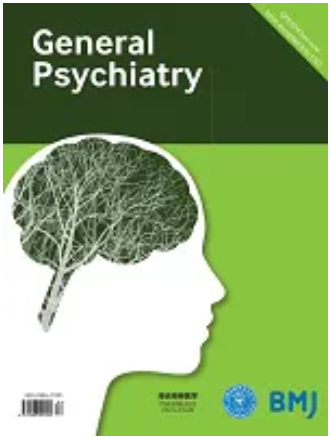Effectiveness of pharmacogenomics on the response and remission of treatment-resistant depression: a meta-analysis of randomised controlled trials
IF 5.3
3区 医学
Q1 PSYCHIATRY
引用次数: 0
Abstract
Background Pharmacogenomics (PGx) is a promising tool to realise tailored drug therapy for depression. Aims To investigate the treatment efficacy of PGx for treatment-resistant depression (TRD) compared with treatment as usual. Methods A systematic search was conducted in PubMed, Embase, the Cochrane Library, Web of Science and PsycINFO to identify relevant studies published from inception to 15 April 2023. Two-arm randomised controlled trials (RCTs) exploring the efficacy of PGx-guided versus unguided treatment for TRD were included. The risk of bias in the included studies was evaluated using the Cochrane risk of bias assessment tool. The overall quality of evidence was assessed using the Grading of Recommendations, Assessment, Development and Evaluation (GRADE) approach. Results Seven RCTs (n=3003) comparing PGx-guided (n=1492) and unguided (n=1511) groups were identified and analysed. PGx-guided treatment was superior to treatment as usual in response (relative risk (RR)=1.31; 95% confidence interval (95% CI): 1.15 to 1.49; p<0.001) and remission (RR=1.40; 95% CI: 1.09 to 1.80; p=0.009) improvements. Effect sizes for acceptability (RR=0.90; 95% CI: 0.80 to 1.02; p=0.100) and side effect burden (RR=0.58; 95% CI: 0.29 to 1.15; p=0.120) between the two groups were not statistically different. The overall quality of evidence was rated from ‘very low’ (25%) to ‘low’ (75%) based on the GRADE criteria. Conclusions PGx-guided treatment has shown a small overall effect in improving the response and remission rates for patients with TRD. However, these results should be interpreted cautiously because of the few included studies and the low quality of evidence. Further high-quality clinical trials are warranted to confirm the findings. PROSPERO registration number CRD42022340182.药物基因组学对耐药性抑郁症的反应和缓解的效果:随机对照试验荟萃分析
背景 药物基因组学(PGx)是实现抑郁症定制化药物治疗的一种前景广阔的工具。目的 研究 PGx 对治疗耐药抑郁症(TRD)的疗效与常规治疗的比较。方法 在PubMed、Embase、Cochrane图书馆、Web of Science和PsycINFO中进行系统检索,以确定从开始到2023年4月15日发表的相关研究。研究纳入了探讨PGx指导与非指导治疗TRD疗效的双臂随机对照试验(RCT)。纳入研究的偏倚风险采用 Cochrane 偏倚风险评估工具进行评估。采用建议、评估、发展和评价分级法(GRADE)对证据的总体质量进行了评估。结果 确定并分析了七项研究性临床试验(n=3003),对PGx指导组(n=1492)和非指导组(n=1511)进行了比较。在改善反应(相对风险 (RR)=1.31; 95% 置信区间 (95% CI): 1.15 至 1.49; p<0.001)和缓解(RR=1.40; 95% CI: 1.09 至 1.80; p=0.009)方面,PGx 指导治疗优于常规治疗。两组患者在可接受性(RR=0.90;95% CI:0.80 至 1.02;p=0.100)和副作用负担(RR=0.58;95% CI:0.29 至 1.15;p=0.120)方面的效应大小无统计学差异。根据 GRADE 标准,证据的总体质量从 "非常低"(25%)到 "低"(75%)不等。结论 PGx 指导下的治疗在提高 TRD 患者的应答率和缓解率方面总体效果较小。然而,由于纳入的研究较少且证据质量较低,因此应谨慎解读这些结果。有必要进一步开展高质量的临床试验来证实这些研究结果。PROSPERO注册号为CRD42022340182。
本文章由计算机程序翻译,如有差异,请以英文原文为准。
求助全文
约1分钟内获得全文
求助全文
来源期刊

General Psychiatry
医学-精神病学
CiteScore
21.90
自引率
2.50%
发文量
848
期刊介绍:
General Psychiatry (GPSYCH), an open-access journal established in 1959, has been a pioneer in disseminating leading psychiatry research. Addressing a global audience of psychiatrists and mental health professionals, the journal covers diverse topics and publishes original research, systematic reviews, meta-analyses, forums on topical issues, case reports, research methods in psychiatry, and a distinctive section on 'Biostatistics in Psychiatry'. The scope includes original articles on basic research, clinical research, community-based studies, and ecological studies, encompassing a broad spectrum of psychiatric interests.
 求助内容:
求助内容: 应助结果提醒方式:
应助结果提醒方式:


